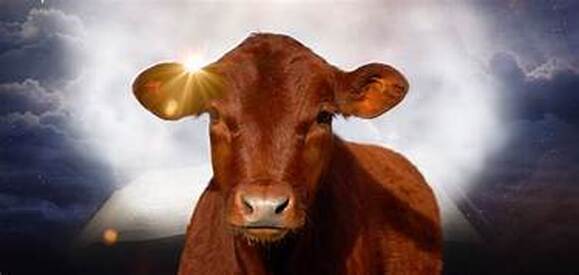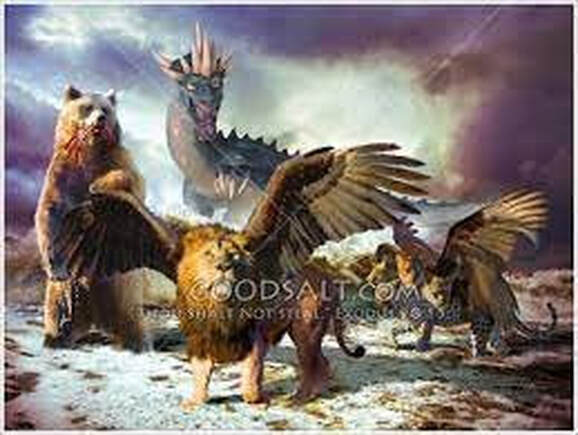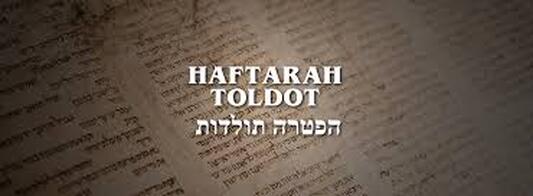Those in the Negev will repossess the mountain of `Esav...
(Obadiah 1:19 CJB)
Jacob's return to the Land is met with countless opposition:
- Laban tries to find fault with Jacob. Jacob convicts Laban of wrong.
- Jacob has to wrestle with an angelic being that leaves him crippled in his thigh.
- Esau comes toward Jacob with a 400-man armed to the teeth. Jacob wins Esau's heart with gifts and humility, prostrating himself begging for forgiveness.
Then he [Jacob) himself passed on ahead of them and prostrated himself on the ground seven times before approaching his brother. `Esav ran to meet him, hugged him, threw his arms around his neck and kissed him; and they wept. Esav looked up; on seeing the women and children, he asked, "Who are these with you?" Ya`akov answered, "The children God has graciously given to your servant." Then the slave-girls approached with their children, and they prostrated themselves; Le'ah too and her children approached and prostrated themselves; and last came Yosef and Rachel; and they prostrated themselves. `Esav asked, "What was the meaning of this procession of droves I encountered?" and he answered, "It was to win my lord's favor." `Esav replied, "I have plenty already; my brother, keep your possessions for yourself." Ya`akov said, "No, please! If now I have won your favor, then accept my gift. Just seeing your face has been like seeing the face of God, now that you have received me. So please accept the gift I have brought you, for God has dealt kindly with me and I have enough." Thus he urged him, until he accepted it.
Esau then extends an invitation:
`Esav said, "Let's break camp and get going. I'll go first." Ya`akov said to him, "My lord knows that the children are small, and the sheep and cattle suckling their young concern me, because if they overdrive them even one day, all the flocks will die. Instead, please, let my lord go on ahead of his servant. I will travel more slowly, at the pace of the cattle ahead of me and at the pace of the children, until I come to my lord in Se`ir."
(Gen 33:3-14 CJB)
Later, we are told:
Ya`akov went on to Sukkot, where he built himself a house and put up shelters for his cattle. This is why the place is called Sukkot [shelters]. (Gen 33:17 CJB)
Jacob never intended to go live with Esau in Edom, Mt Seir. Did Jacob lie? The Haftara this week may give us an answer.
The Haftara this week is the whole book of Obadiah. One chapter, 21 verses. The prophecy of Obadiah could be summed up as: What goes around, comes around.
"WE HEARD A MESSAGE..."?
This is the vision of `Ovadyah. Here is what Adonai Elohim says about Edom. As a messenger was being sent among the nations saying, "Come on, let's attack her," we heard a message from Adonai: (Oba 1:1 CJB)
Who is "we?" Nine different prophets spoke of the destruction of Edom. (Click HERE for more info) Balaam, Isaiah, Joel, Amos, Jeremiah, Ezekiel, Malachi, and David in the Psalms. Ezekiel, Daniel, and Jeremiah were contemporary to Amos.
Obadiah draws from the prophecies of his contemporaries, especially from Jeremiah. I will put some examples here. Though the English doesn't compare, the original Hebrew text from the bold font are the same.
Both Obadiah and Jeremiah mention about Edom's conceited vision of herself and how HaShem will make them small among the nations. Any nation with that kind of pride is doomed to destruction.
This is the vision of `Ovadyah. Here is what Adonai Elohim says about Edom. As a messenger was being sent among the nations saying, "Come on, let's attack her," we heard a message from Adonai: ומו ונקומה עליה למלחמה (Oba 1:1 CJB)
I have heard a message from Adonai: "A messenger is sent among the nations, saying: 'Gather together, and march against her! Prepare for battle!' וקומו למלחמה (Jer 49:14 CJB)
"I am making you the least of all nations, you will be beneath contempt. קטן נתתיך בגוים (Oba 1:2 CJB)
Here! I will make you least among nations, the most despised of people. קטן נתתיך בגוים (Jer 49:15 CJB)
Your proud heart has deceived you, you whose homes are caves in the cliffs [Allusion to Petra), who live on the heights and say to yourselves, 'Who can bring me down to the ground?' If you make your nest as high as an eagle's, even if you place it among the stars, I will bring you down from there." says Adonai.
(Oba 1:3-4 CJB)
Here! I will make you least among nations, the most despised of people. Your capacity to terrorize has deceived you and made you arrogant. You make your home in the rocky crags and seize the top of the mountain (Allusion to Petra); but even if you build your nest high as an eagle's, from there I will drag you down," says Adonai.
(Jer 49:15-16 CJB)
HASHEM USES OTHER NATIONS TO MAKE WARS AGAINST EDOM. Even former allies turn against Edom!
Again, we see the common thread between Jeremiah and Obadiah:
If thieves were to come to you, or if robbers by night (Oh, how destroyed you are!), wouldn't they stop when they'd stolen enough? If grape-pickers came to you (see Jer 49:9), Wouldn't they leave some grapes for gleaning? But see how `Esav has been looted, their secret treasures searched out! Your allies went with you only to the border, those at peace with you deceived and defeated you, those who ate your food set a trap for you, and you couldn't discern it. (Oba 1:5-7 CJB)
EDOM ONCE PROTECTED
In the past, HaShem had ordered Israel against the destruction of Edom. Edom was protected because he is from the seed of Abraham.
(23:8) "But you are not to detest an Edomi, because he is your brother; and you are not to detest an Egyptian, because you lived as a foreigner in his land. (23:9) The third generation of children born to them may enter the assembly of Adonai. (Deut 23:7-8 CJB)
But now, the destruction of Edom is pronounced:
"When that Day comes," says Adonai, "won't I destroy all the wise men of Edom and leave no discernment on Mount `Esav? Your warriors, Teman, will be so distraught that everyone on Mount `Esav will be slaughtered. (Oba 1:8-9 CJB)
EDOM LOOSE ITS DIVINE PROTECTION...WHY?
Nations made war against Israel but if Edom made war against Israel, he was doubly guilty because they were brothers and brothers are supposed to "keep" each other, not join enemies against each other.
For the violence done to your kinsman Ya`akov, shame will cover you; and you will be forever cut off. (Oba 1:10 CJB)
When Babylon came to burn Jerusalem and its Temple, when they brought the captives of Judah away, Edom had a drinking party on the Temple Mount, they drank a toast to the destruction of Jerusalem.
On that day you stood aside, while strangers carried off his treasure, and foreigners entered his gates to cast lots for Yerushalayim -- you were no different from them.
(Oba 1:11 CJB)
Gloating over the demise of your enemy is forbidden in the Torah (Prov 24:15).
You shouldn't have gloated over your kinsman on their day of disaster or rejoiced over the people of Y'hudah on their day of destruction. You shouldn't have spoken arrogantly on a day of trouble (Oba 1:12 CJB)
Edom shouldn't have joined in the looting of Jerusalem.
...Or entered the gate of my people on their day of calamity -- no, you shouldn't have gloated over their suffering on their day of calamity or laid hands on their treasure on their day of calamity. (Oba 1:13 CJB)
Like Amalek when Israel came out of Egypt, they preyed on the weak fugitives.
You shouldn't have stood at the crossroads to cut down their fugitives or handed over their survivors on a day of trouble." (Oba 1:14 CJB)
Because of all these things, divine protection is gone. Edom will be punished even heavier than all the other nations that came against Israel.
What goes around, comes around!
For the Day of Adonai is near for all nations; as you did, it will be done to you; your dealings will come back on your own head. For just as you have drunk on my holy mountain, so will all the nations drink in turn; yes, they will drink and gulp it down and be as if they had never existed. (Oba 1: 15-16 CJB)
WHAT CAN WE LEARN FROM THIS?
This teaches us some very important lessons.
Edom was supposed to see itself at least as a brother to Israel. Instead of that, it turned against Israel, joining the enemies of his brother. In the same manner, those who had made peace treaties with Edom now turn against him.
While we may have disputes with family members, we should always remember that they are family members, whether biological or spiritual! HaShem expects us to act as such and when we don't, He visits us!
Also, we can learn that what goes around, comes around!
Sometime we may wonder why what happens to us does happen to us.
Sometimes we may wonder why people treat us a certain way.
Sometimes we may wonder why people are selfish or indifferent to us.
Maybe we are reaping what we have sown.
Maybe it is the bread that we have cast upon the waters that is returning to us.
Maybe we need to start looking at how we have treated others.
Just a lesson from Edom to think about!
THE END OF THE STORY
A remnant escapes.
But on Mount Tziyon there will be a holy remnant who will escape, and the house of Ya`akov will repossess their rightful inheritance. (Oba 1:17 CJB)
Reversal of fortunes. This time, Jacob will be the fire and Edom will be like hay and stubble. The house of Esau will eventually disappear.
The house of Ya`akov will be a fire and the house of Yosef a flame, setting aflame and consuming the stubble which is the house of `Esav. None of the house of `Esav will remain, for Adonai has spoken. (Oba 1:18 CJB)
JACOB GOES TO MT. SEIR, AS HE SAID HE WILL IN THE PARASHA, IN GENESIS 33:14
At the end of times, exiles as far as France and Spain will return and take possession of the cities of the Negev. These people living in the Negev will take possession of the Mountain of Esau.
Those in the Negev will repossess the mountain of `Esav, and those in the Sh'felah the land of the P'lishtim; they will repossess the field of Efrayim and the field of Shomron, and Binyamin will occupy Gil`ad. Those from this army of the people of Isra'el exiled among the Kena`anim as far away as Tzarfat, and the exiles from Yerushalayim in S'farad, will repossess the cities in the Negev. (Oba 1:19-20 CJB)
Even today, there are Sephardic Jews dwelling in the Negev communities. Eventually, Mount Zion rules over Mount Esau.
Then the victorious will ascend Mount Tziyon to rule over Mount `Esav, but the kingship will belong to Adonai. (Oba 1:21 CJB)
TALMUDIC NOTE:
Jewish midrash and eschatology always associates Edom with Rome as well as the embodiment of any enemy of Israel. This last verse of Obadiah therefore is often interpreted as the coming of Messiah.
HABBAT SHALOM



 RSS Feed
RSS Feed